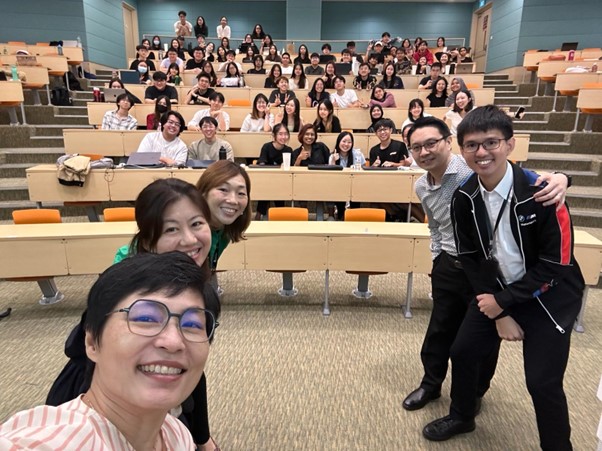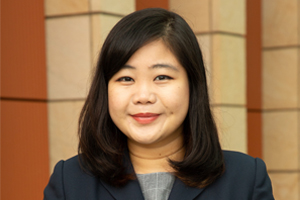Why ACC?
- Our curated “Professional Journey” equips you with confidence and skills for key roles in controllership, assurance, and finance business partnership
- Gain future-ready tech and sustainable accounting skills to seize opportunities in the fast-growing digital and green economies
- Enjoy accreditation and module exemptions at top universities and professional bodies – ACC graduates offered the most module exemptions by SMU!
- Customise your learning: Choose a six-month local/overseas internship + Business Electives NEW! in emerging areas; or the one-year JobReady Programme with renowned companies
About ACC
If you think that accountancy is all about number
crunching, think again! In today’s dynamic business
environment, accountants are the ones driving
business innovation and solutions.
The financial
controller or accountant of the future is equipped with
digital tools to make data-driven decisions that unlock
business opportunities! If this excites you, our Diploma
in Accountancy (ACC) could be the perfect fit for you!
Your ACC journey trains you for rewarding careers in
accounting and beyond! Our curated professional
learning journey curriculum trains you for roles such
as finance controllers, assurance consultants, and
finance business partners.
The course provides a solid foundation in core
accounting principles, coupled with essential
transferable skills. You will learn how to analyse
financial data, evaluate risks, and help businesses
transform. You will also benefit from robust real-world
learning, thanks to our strong ties with leading
industry players.
Stay ahead of the curve with in-demand digital
skills – including Generative AI, data analytics, and
accounting and finance automation tools. With
sustainability now a key priority for businesses, you will
also learn to evaluate the financial impact of climate-related risks and help organisations set environmental
goals.
On top of that, you will gain exposure to essential
business functions such as digital marketing and learn
the application of legal frameworks in accounting
practice.
Choose how and what you learn in your final year! Opt for a six-month local/overseas internship together with an industry project and two electives from the brand-new Business Electives Programme; or choose the one-year JobReady Programme for deeper industry
immersion.
Designed to supercharge your learning, the Business Electives Programme focuses on the latest strategic growth areas in business:
- Business Psychology
- AI & Digital Transformation
- Business Sustainability
Our top-notch industry partners offering internships include Deloitte, EY, KPMG, PwC, BDO, RSM, Bosch and GIC.

As an ACC graduate, you can look forward to
completing your degree or professional examinations
ahead of your peers! The Singapore Management
University (SMU), for example, offers ACC graduates
the most module exemptions compared to other
polytechnics! So, you can fast track your SMU degree
by up to a year!
You will also enjoy accreditation and module
exemptions from many professional bodies such as
The Institute of Singapore Chartered Accountants
(ISCA), Association of Chartered Certified Accountants
(ACCA), Chartered Institute of Management
Accountants (CIMA), and Institute of Chartered
Accountants in England and Wales (ICAEW).
Overview of your ACC Journey

Highlights
Impactful Internships
Further Studies
ACC is recognised by all local and many overseas
universities. Many universities in Australia and the
United Kingdom offer up to one year of exemption.
You will also enjoy module exemptions for courses and
examinations by the Institute of Singapore Chartered
Accountants (ISCA), Association of Chartered
Certified Accountants (ACCA), Chartered Institute of
Management Accountants (CIMA), and Institute of
Chartered Accountants in England and Wales (ICAEW).
In partnership with the Accounting and Corporate
Regulatory Authority and Workforce Singapore, NP has
launched a 12- to 18-month work-study programme
under the SkillsFuture initiative. This programme offers
an accelerated alternative pathway for Accountancy
diploma holders to enter the profession without a
degree qualification.
| Chartered Accountant of Singapore |
Singapore CA Qualification (Professional Programme) |
Advanced Diploma in Accountancy (Singapore CA Qualification Foundation Programme) |
| Diploma in Accountancy |
Careers
You can look forward to exciting and rewarding careers in roles such as:
- Business Analyst
- Business Valuation Consultant
- Digital Transformation Specialist
- Environment, Social & Governance (ESG) Auditor
- Financial Accountant
- Financial Auditor
- Finance Business Partner
- Forensics Accountant
- Internal Auditor
- Mergers & Acquisition Consultant
- Restructuring & Insolvency Consultant
- Sustainability & Climate-change Consultant
- Tax Consultant
Entry Requirements
AGGREGATE TYPE ELR2B2-B
To be eligible for consideration, candidates must have the following GCE ‘O’ Level examination (or equivalent) results.
| Subject | 'O' Level Grade |
|---|---|
| English Language | 1-6 |
| Additional Mathematics/Mathematics | 1-6 |
| Any one of the 2nd group of Relevant Subjects for the ELR2B2-B Aggregate Type | 1-6 |
Applicants must also fulfil the aggregate computation requirements for the ELR2B2-B Aggregate Type ( English Language, 2 relevant subjects and 2 other best subjects) listed at www.np.edu.sg/docs/ELR2B2.pdf .
For students with other qualifications, please refer to the NP website for the entry requirements and admissions exercise period.
What You Will Learn
Data Analytics (3 Credit Units)
This module equips students with the essential skills to extract meaningful insights from data. Through a blend of theoretical concepts and practical applications using data visualisation tools, students will learn to collect, clean, analyse, and visualise data to inform decision-making. The module emphasizes critical thinking, problem-solving, and the ability to communicate findings effectively.
Economics (3 Credit Units)
This module provides students with an understanding of the core principles of microeconomics and macroeconomics with an application of these concepts in real-world business scenarios. Topics include Demand and Supply, Price Elasticity, Market Structure, Gross Domestic Product, Unemployment, Inflation, Fiscal and Monetary policy.
Global Business (3 Credit Units)
This module provides students with fundamental knowledge of how the external business environment, consisting of country and industry level factors, affects the overall strategy, organisational structure and various internal functions of international businesses. Students will also discuss how contemporary world affairs, such as the impact of globalisation, terrorism, pandemics, emergence of economic powers in Asia and digitalisation present both opportunities and challenges to international businesses.
Makings of a Business (4 Credit Units)
Students will gain hands-on and real-world experience as they actively learn to integrate and apply knowledge and skills acquired in various modules to manage different types of businesses through game simulation. They will gain understanding of the inter-dependence of the different business functions, and to make data-driven decisions to address day-to-day operations of a business. They will also develop critical thinking and complex problem-solving skills as they analyse performance data and evaluate decisions to improve overall company performance.
Statistical Applications for Business (4 Credit Units)
This module introduces students to basic statistical concepts, tools, models, and the introductory use of generative AI. Students will learn how to organise and analyse data, as well as interpret results for decision-making in the business world. Students will apply and reinforce their learnings through data presentation, use of AI, performing descriptive analysis and data generated from the Business Simulated Game.
Health & Wellness (1 Credit Unit)
This is a Level 1 Core module for all Year 1 students. The module will introduce students to the importance of maintaining both physical and mental health through the knowledge and monitoring of health indicators, and application through appropriate exercises. The aim of the module is to empower students with basic knowledge and skills to be independent and responsible in maintaining overall personal health.
Innovation Made Possible^ (3 Credit Units)
English Language Express* (Credit Units - NA)
English Language Express aims to give you a better grounding in the English Language and to strengthen the written and oral communications skills that you will need in your academic and professional careers. You will be engaged in writing, reading, listening and speaking activities that will develop your ability to speak and write grammatically, coherently and clearly. You will also hone your reading and listening comprehension skills.
* This module is only offered to students who are weaker in the English Language.
^ Critical Core modules account for 10 credit units of the diploma curriculum. They include modules in innovation and world issues, as well as an interdisciplinary project. By bringing students from diverse diplomas together, the interdisciplinary project fosters collaboration to explore and propose solutions for real-world problems. NP aims to develop students to be agile and self-directed learners, ready for the future workplace.
This module equips students with essential written and oral communication skills for professional success. Students will learn to craft clear and logical business messages, deliver impactful elevator pitches, and present persuasive business ideas using storytelling and persuasion principles. They will also create a professional digital profile to enhance their online presence, building their confidence to engage and network with a diverse audience.
Career & Professional Preparation (2 Credit Units)
This module supports students in their journey of self-discovery, character-building, NP values-inculcation, development of education and career goals via experiential activities and guided reflections with CPP coaches. To prepare them for their career and the future, students will also deepen their knowledge of the respective diploma curriculum and industries through learning journeys, mentorship and opportunities for interactions with alumni and industry practitioners. The module will incorporate a more comprehensive feedback and reflective approach from self, peers, tutors and the industry mentor to support students’ holistic growth and development.
Digital Experience Design (3 Credit Units)
This module equips students with practical skills in user-centred design for business digital applications, covering key design principles, interface and experience evaluation across platforms, and the use of AI-powered software tools and highlighted through examples like AI-enabled solutions.
Finance & Accounting for Business (3 Credit Units)
The module imparts basic accounting and finance knowledge to students, in areas such as accounting equations, accounting principles, financial statements, ratio analysis, cash budgeting, short-term financing strategies, time value of money and capital investment analysis. Students will demonstrate their understanding by using financial software to interpret financial accounting information for decision-making in business environments when working on integrated project scenarios.
Kickstart a Business (4 Credit Units)
The module is designed for students to integrate and apply learning from the different modules to address real-world challenges provided by industry partners. Using the Lean methodology, students will build a Lean Canvas Model to develop and showcase a minimum viable product to address challenges and evaluate opportunities. They will learn about resource optimisation and value creation for businesses.
Marketing (3 Credit Units)
The module provides students with a strong foundation in marketing, equipping them with the skills necessary to develop effective marketing plans and strategies for the digital landscape. Students will gain a comprehensive understanding of fundamental marketing concepts, with a specific focus on their application in the digital realm.
This module provides students with foundational legal concepts, including the Singapore legal system and laws of contract and tort, along with emerging legal trends. Students will learn about the different forms of business organisations, directors’ duties, corporate governance best practices, and compliance in areas such as financial reporting, anti-money laundering, corporate recovery and insolvency, with an emphasis on their relevance to the accounting profession.
Corporate Finance and Analysis (3 Credit Units)
The module aims to introduce fundamental concepts of corporate finance and tools for financial decision-making. Students will learn about the financial objectives of an organisation, financial management concepts as well as valuation skills such as financial statement analysis and common techniques on business valuation.
Financial Accounting (6 Credit Units)
This module introduces students to the fundamental principles of accounting, including the accounting equation, double-entry, and the analysis and recording of business transactions. Other topics include end-of-period adjustments, accounting for cash & credit transactions, inventories, fixed assets, liabilities and preparation of financial statements for service and trading concerns.
Professional Branding & Networking (4 Credit Units)
This module enhances students' communication skills by focusing on professional branding and networking. Students will learn to craft impactful job application letters and resumes, develop effective job interview techniques through online lessons and role-plays, and strengthen their professional digital profiles. They will also participate in networking simulations across diverse business settings, equipping them with the confidence and skills needed for career success.
Taxation (4 Credit Units)
This module provides students with a practical understanding of Income Tax and Goods and Services Tax (GST) in various business and individual contexts. Students will learn to compute tax liabilities and apply tax regulations for both individuals and organisations. The module equips students with the skills to navigate real-world taxation scenarios and make informed tax-related decisions.
This module equips students with management accounting principles for effective business planning and decision-making. Students will learn to identify, analyse and interpret business and sustainability-related issues using artificial intelligence (AI). By the end of the module, students will be able to apply AI-powered insights and management accounting techniques to solve real-world business problems.
Assurance, Risk & Forensics (6 Credit Units)
This module provides a foundation in risk assessment, internal controls, and forensic analysis within an accounting context. Students will explore business and sustainability-related risks, applying internal controls to detect potential misconduct. The module covers audit planning, control testing, and audit procedures in accordance with the Singapore Standards on Auditing. Students will develop critical thinking, professional skepticism, and ethical judgment, equipping them with the skills and mindset for a career in audit, risk management and forensic accounting.
Corporate and Sustainability Reporting (6 Credit Units)
This module develops students' ability to prepare financial statements and disclosure requirements for limited liability companies in accordance to Singapore’s Financial Reporting Standards (FRS) and relevant regulations. Students are also equipped with an understanding of sustainability reporting standards and disclosure requirements of non-financial information.
Digital Intelligence for Community (2 Credit Units)
This module empowers accounting students with essential digital intelligence tools to leverage technology for societal impact. Through hands-on projects, students will apply digital skills, data literacy, and ethical technology use in service learning to deepen their understanding while enhancing their professional competencies.
World Issues : A Singapore Perspective^ (2 Credit Units)
^ Critical Core modules account for 10 credit units of the diploma curriculum. They include modules in communication, innovation and world issues, as well as an interdisciplinary project. By bringing students from diverse diplomas together, the interdisciplinary project fosters.
Year 3
Students can choose from the following options in Year 3:
Capstone Project
The module serves as a culminating experience, allowing students to integrate and apply the knowledge and skills acquired throughout their coursework to solve real-world industry challenges. Through research, data analysis, critical thinking, and problem-solving, students will develop solutions that bridge academic learning with practical application preparing them for the demands of the modern workplace and enhance their readiness for future career opportunities.
Electives 1 & 2 (4 Credit Units each)
Students can choose any 2 Electives from the Business Electives Programme.
Project ID – Connecting the Dots^(4 Credit Units)
^ Critical Core modules account for 10 credit units of the diploma curriculum. They include modules in communication, innovation and world issues, as well as an interdisciplinary project. By bringing students from diverse diplomas together, the interdisciplinary project fosters collaboration to explore and propose solutions for real-world problems. NP aims to develop students to be agile and self-directed learners, ready for the future workplace.
Students will acquire work experience through supervised work immersion and on-the-job training of six months with public accounting firms, multinationals and other organisations. Students learn beyond the classroom boundaries with professional practitioners as their mentors. They will be provided with relevant training and equipped with knowledge and skills to enable them to perform effectively in their workplace attachments.
Multidisciplinary Capstone Project
The module challenges students to collaborate across disciplines, applying their expertise to real-world industry problems. Accounting students will work alongside peers from diverse fields, integrating financial acumen with interdisciplinary problem-solving. Emphasising teamwork, critical thinking, and effective communication, this module prepares students for dynamic, cross-functional roles in the professional world. By bridging academic learning with practical application, the capstone fosters adaptability, collaboration, and innovation—key skills for future career success.
Electives 1 & 2 (4 Credit Units each)
Students can choose any 2 Electives from the Business Electives Programme.
Six-month Internship (20 Credit Units)
Students will acquire work experience through supervised work immersion and on-the-job training of six months with public accounting firms, multinationals and other organisations. Students learn beyond the classroom boundaries with professional practitioners as their mentors. They will be provided with relevant training and equipped with knowledge and skills to enable them to perform effectively in their workplace attachments.
One-Year JobReady Programme
This industry attachment provides authentic learning experiences in a real-world, and self-driven learning environment for students to apply their competencies to practical work issues. Students will acquire work experience through supervised work immersion and on-the-job training with public accounting firms, multinationals and other organisations with professional practitioners as their mentors.
This industry attachment provides students with an additional opportunity for on-the-job training. Besides gaining skills and knowledge as well as first-hand experience in the accountancy sector, students can expand their network and portfolio. They will be coached by a mentor in the company throughout the period of attachment
Project ID – Connecting the Dots^ (4 Credit Units)
^ Critical Core modules account for 10 credit units of the diploma curriculum. They include modules in communication, innovation and world issues, as well as an interdisciplinary project. By bringing students from diverse diplomas together, the interdisciplinary project fosters.
Business Electives Programme
This module explores how consumers think, feel, and act in digital environments. Students will analyse digital behaviour, assess market sentiment, and design behaviourally informed experiences. Using nudging techniques, behavioural analytics, and psychological insights, they will design customer-focused experiences that subtly guide decisions, boost engagement, drive conversions, and optimise digital interactions. Ethical considerations in influencing consumer behaviour will also be discussed.
Behavioural Insights for Strategic Communications
This module explores developing effective communication strategies that build trust, influence behaviour, and resonate across diverse cultural contexts. Students will learn to create strategic communication approaches, apply trust-building techniques, and craft behavioural content that drives engagement. Through a cross-cultural lens, they will analyse how communication styles affect perception, decision-making, and relationships in business and digital environments.
Behavioural Insights for Workplace Experiences
This module explores how UX psychology, nudging, and design principles create better workplace experiences. Students will learn to design employee experiences, apply psychology to workplace interactions, and use behavioural nudges to improve productivity and well-being. They will also measure experience initiatives and track innovation trends. By integrating workplace psychology, UX, and behavioural insights, students will develop strategies to boost employee engagement and organisational effectiveness.
This module blends theory and practice to equip students with predictive analytics and data visualisation skills. They will learn to analyse structured and unstructured data, spot trends, and apply machine learning and statistical techniques to solve business problems. Emphasising data-driven decision-making, the module covers advanced visualisations and storytelling to communicate insights effectively. Through real-world projects, students will use open-source tools and basic coding to develop data-driven strategies for industry challenges.
AI in Business
This module introduces students to the transformative role of AI in business, covering key technologies such as machine learning, computer vision, NLP, and robotics. Students will apply generative AI and automation tools, including large language models and AI agents. The module showcases applications of AI across industries while highlighting the critical role of data quality, ethics, and responsible use. Learning culminates in a hands-on project, equipping students to contribute to AI initiatives in business effectively.
Digital Innovation & Transformation
This module examines how digital innovation transforms businesses, equipping students with the skills to identify opportunities, develop strategies, and implement transformative solutions. They will assess business environments, leverage emerging technologies, and apply strategic thinking to drive innovation. Students will conceptualise, prototype, and deliver digital solutions through a hands-on project while mastering stakeholder collaboration, project management, and change implementation. By the end of the module, they will be prepared to lead and support digital transformation initiatives for sustainable growth and competitive advantage.
This module explores innovative and sustainable approaches businesses can adopt to drive positive environmental and economic impact. Learners will examine how organisations collaborate with stakeholders to foster responsible practices, optimise resource use, and transition toward long-term sustainability. Through case studies and real-world applications, students will develop critical thinking skills and adaptability to emerging global trends, ensuring their ability to implement forward-looking strategies in a rapidly evolving business landscape.
Carbon Management
This module provides an overview of carbon management in business, covering key concepts, frameworks, and industry practices related to sustainability. It examines the role of policies, reporting systems, and strategies for managing environmental impact. Students will explore approaches to addressing carbon-related challenges in various business contexts through discussions and applied learning.
Governance & Sustainability Reporting
This module introduces students to sustainability governance in business, focusing on the controls, policies, and data-gathering processes for effective sustainability reporting. Students will explore how organisations assess materiality and prepare sustainability-related disclosures using major reporting frameworks. The course also covers sustainability best practices across industries to ensure transparency, accountability, and long-term value creation.
Sustainable Finance
Students will explore how financial decisions impact Environmental, Social, and Governance (ESG) matters, leverage financial resources to benefit both the economy and the environment, and assess risks associated with sustainability issues. They will also be introduced to various green and transition financial instruments and sustainable investments to achieve long-term sustainability goals.











